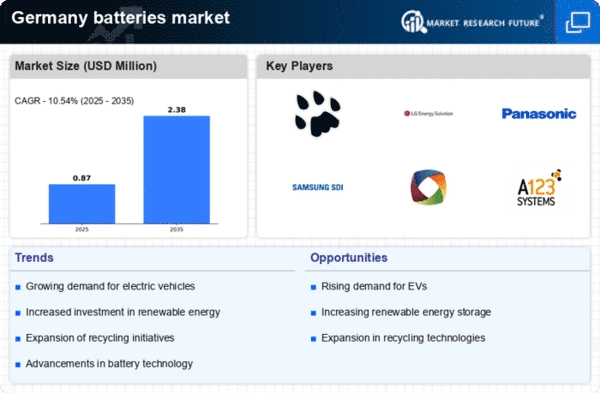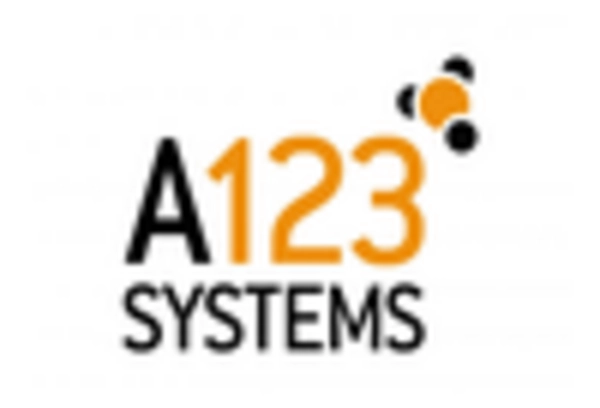Rising Demand for Renewable Energy Storage
The increasing emphasis on renewable energy sources in Germany is driving the batteries market. As the country aims to transition to a low-carbon economy, the need for efficient energy storage solutions becomes paramount. Batteries play a crucial role in storing energy generated from solar and wind sources, which are inherently intermittent. In 2025, the share of renewable energy in Germany's electricity consumption is projected to reach approximately 50%. This shift necessitates advanced battery technologies to ensure a stable energy supply, thereby propelling the batteries market forward. Furthermore, the integration of energy storage systems in residential and commercial sectors is expected to enhance energy independence, further stimulating market growth.
Government Incentives for Battery Production
Government incentives aimed at boosting domestic battery production are shaping the batteries market in Germany. In 2025, the German government has introduced various subsidies and tax breaks to encourage local manufacturers to establish battery production facilities. This initiative is part of a broader strategy to reduce reliance on imports and enhance energy security. By fostering a competitive domestic battery industry, Germany aims to create thousands of jobs and stimulate economic growth. The establishment of gigafactories is expected to increase production capacity significantly, potentially doubling the output of batteries by 2030. Such measures are likely to enhance the batteries market's resilience and sustainability.
Technological Advancements in Battery Chemistry
Innovations in battery chemistry are significantly influencing the batteries market in Germany. The development of lithium-ion batteries has revolutionized energy storage, offering higher energy densities and longer lifespans. Recent advancements, such as solid-state batteries, promise even greater efficiency and safety. The German government has invested heavily in research and development, with funding exceeding €1 billion in 2025 aimed at fostering innovation in battery technologies. This focus on R&D is likely to yield breakthroughs that enhance performance and reduce costs, making batteries more accessible for various applications, including electric vehicles and grid storage. As a result, the batteries market is poised for substantial growth driven by these technological advancements.
Growing Consumer Awareness of Environmental Impact
Consumer awareness regarding the environmental impact of energy consumption is increasingly influencing the batteries market in Germany. As individuals become more conscious of their carbon footprints, there is a rising demand for eco-friendly battery solutions. This trend is evident in the growing popularity of batteries that utilize sustainable materials and are designed for recyclability. In 2025, surveys indicate that over 70% of German consumers prioritize sustainability when purchasing electronic devices and vehicles. This shift in consumer behavior is prompting manufacturers to innovate and produce greener battery options, thereby driving the batteries market towards more sustainable practices. The alignment of consumer preferences with environmental goals is likely to shape the future landscape of the market.
Increased Investment in Electric Mobility Infrastructure
The expansion of electric mobility infrastructure in Germany is a key driver for the batteries market. With the government setting ambitious targets for electric vehicle (EV) adoption, the need for a robust charging network is becoming increasingly apparent. By 2025, Germany aims to have over 1 million public charging points, significantly enhancing the convenience of EV ownership. This infrastructure development not only supports the growth of electric vehicles but also creates a parallel demand for advanced battery technologies. As more consumers transition to EVs, the batteries market is likely to experience a surge in demand for high-performance batteries that can support longer ranges and faster charging times.

















